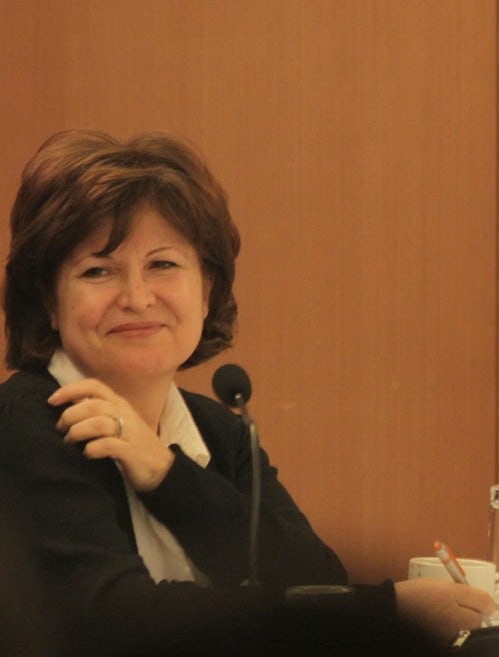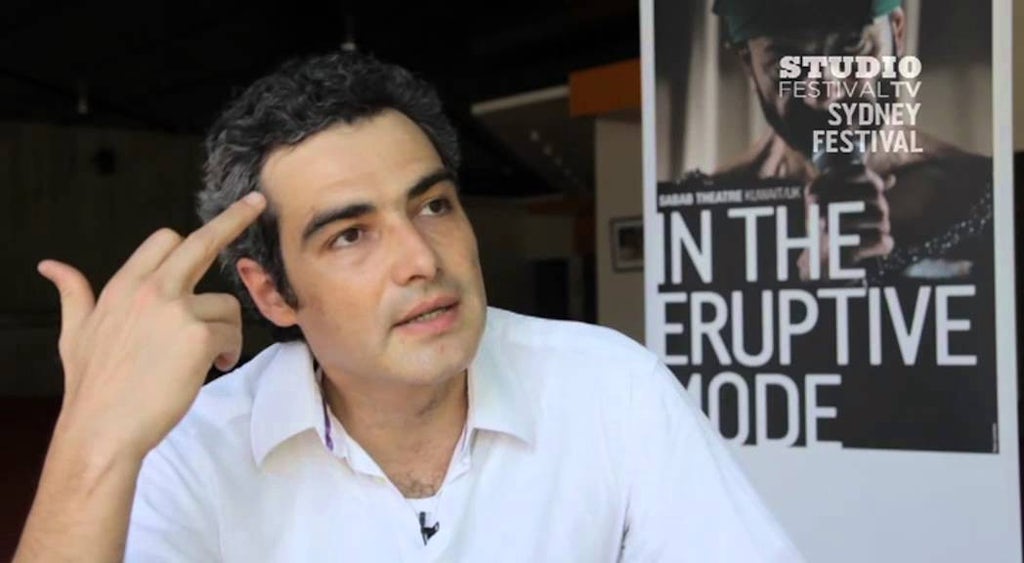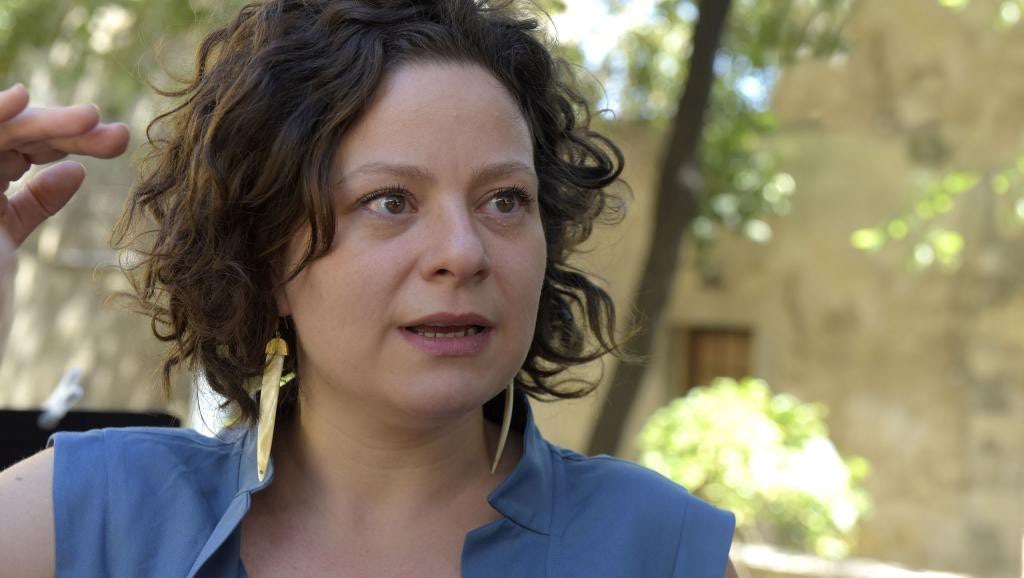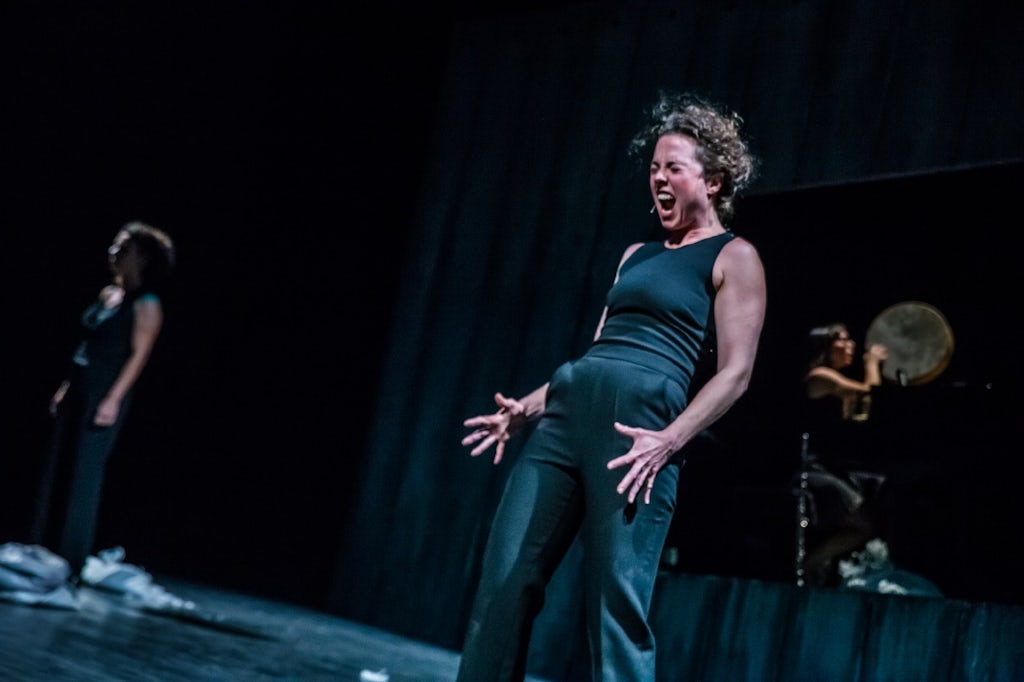
Moving contexts
Round table discussion with Hanan Kassab-Hassen, Sulayman Al Bassam and Hala Moughanie
On 20 October 2017, Moussem and Flanders Arts Institute organized a round table in deSingel (Antwerp) with Hanan Kassab-Hassan, Sulayman Al Bassam and Hala Moughanie about the different contexts in which their work functions and the (im)possibilities of transferring artistic work from one context to another. The round table took place in the scope of Moussem Repertoire, a mini festival that wants to put the spotlight on ‘new repertoire’ and ‘other narratives’. The festival consisted of staged readings, performances, book presentations and a context programme to explore the work in greater depth. As a nomadic arts centre, Moussem questions the prevailing artistic canon and focuses on artists and writers that are connected with the MENA region.
Hanan Kassab-Hassan (1952) is an author and academic; she obtained a PhD in Theatre Studies at the Sorbonne in Paris and was head of various institutions (Damascus Opera House, Damascus Cultural Capital of the Arab World, Damascus Higher Institute for Dramatic Arts). She is a member of several international cultural organisations. She has directed and translated plays and published research and articles on the performing arts.

Author and director Sulayman Al Bassam (1972) lives and works in London and Kuwait. His plays have been performed in leading theatres and festivals among the globe such as Sydney Festival, BAM New York, D-CAF Cairo, Holland Festival, Tokyo International Arts Festival… Recent productions as writer/director include: Petrol Station, In the Eruptive Mode, The Speaker’s Progress and Ritual for a Metamorphosis by Saadallah Al Wannous for La Comedie Francaise in Paris. His adaptations of Shakespeare plays have been published as The Arab Shakespeare Trilogy.

Writer Hala Moughanie (Beirut 1980) lived in Paris for fifteen years where she studied philosophy and literature at the Sorbonne. In 2003 she returned to Beirut where she has lived and worked since. For Tais-toi et creuse she received ‘Le Prix Theatre RFI’ in France. She wrote La mer est ma nation for Théâtre de l’Aquarium and is currently working on her third theatre piece Alma and writing her first novel.

Challenges
Moderators Delphine Hesters (Flanders Arts Institute) and Esther Severi (Kaaitheater) want to speak about what happens when you move an artwork from one social context to another. What are challenges, strategies? The three interlocutors are asked to think about a moment when one of their works moved contexts successfully, or unsuccessfully.
Sulayman talks about his experience with his last piece, Petrol Station. He writes in English about geographies and imagined geographies that are other than English, such as Islamic, Arab. This question of crossing forms, meanings and cultures leads to further questions of what the significance might be of portraying Arab characters and issues … He recently decided to take this question one step further: Petrol Station takes place in an ‘Islamic geography’, but what would happen if it would play in English, and with American (non-Arab) actors? This reveals identity questions and power relations … He only realized later that many people took deep offense of the fact that he produced Petrol Station in English with Americans while maintaining the Arab characters in the play … The Arab men were quite disgusting characters in this play, and were played by Americans. As if it would be OK if he would have portrayed the characters by ‘Arab’ bodies in Arab languages … As soon as these characters were portrayed in a ‘different’ kind of body, it seemed to become extremely offensive. The play was staged in the Kennedy Centre in Washington where it was censored. Some satirical moments around Trump had to be altered.
The play In the Eruptive Mode that was staged during Moussem Repertoire, is regarded as offensive by nationalists, as it is considered as ‘exposing the dirty laundry’. There is an assumption that, as an ‘Arab theatre director’, you need to be an ambassador. You are always expected to be representative of something, of some truth. “There is a sense of paranoia around self-presentation.”
Hala does not care about how her writings are going to be perceived or received. Going to other places, she does not have a specific expectation. Maybe this makes her quite open to positive things. She usually listens to the audience. An interesting experience was the recent presentation of her text in Conacry (Guinea). The audience in Guinea understood the text in a different way: corruption was important, but war en violence less so. This makes her see the complexity of what she writes. The Dutch translation of her text Tais-toi et creuse, facilitated by Moussem, is presented during Moussem Repertoire as Kop dicht en graven. Hala is not an actor nor director and in that sense, she has a theoretical approach. As an author, you give your text to the audience once you finish it; you do not own it anymore and she is fine with that. Maybe the audience understands it in a way the author did not mean it, but that is OK. The text becomes a tangible object to her … “I cannot understand my own text. That is interesting — it is like somehow, there is something in this initiative that is almost poetical. My own text becomes completely hermetic to myself, as if it were pure poetry.”
Hanan does not believe that an author or director does not think about their audience when they write. She wonders why Shakespeare was all the time adapted and presented in Arab countries and never Racine for example? Probably because Shakespeare touched the questions of power/domination and mythology, while Racine does not speak about this.
All the time, big issues and causes were presented on Arab stages. At a certain point, the transformation started, when a new generation of Arab writers started to write about their own life, their relationships, their social life, their family … These issues were never discussed in the Arab theatre before.
Fifteen years ago, The Al-Hamlet Summit appeared, the first part of Sulayman’s Arab Shakespeare trilogy. Sulayman says he “took his ‘Shakespearian vehicles’ and used them to plough his politics, to tackle the big questions, such as freedom, God …” His piece In the Eruptive Mode consists of six monologues that express women’s relations in the Arab spring, and in that sense also the narrative ‘exploded’. Sulayman describes a new movement in theatre, that is fed by despair of what the political power of theatre might be. The spaces theatre is able to occupy … Theatre as a motor of change used to be one of his obsessions for a long time, but now, he is not convinced anymore that theatre can fulfil that function of change. This was a chimère, an illusion …

Hala and Hanan are sceptical as well towards the idea of theatre as a motor for change.
For Hala, theatre is the perfect space to show conflictual situations and to scrutinize the systems in which we evolve and live. The idea is not to change, but to try to understand the world in its complexity and violence. This could have an impact, but it is very limited: “It is not our mission as writers to change the world; this is the mission of politics. Our ambition is to show or understand it.”
According to Hanan, there was a time when theatre could change something. Le théâtre de l’opprimé by Augusto Boal could create situations and provoke people to react. Also Brecht had the wish to be able to change the reality. She talks about a Turkish playwright whose plays time and time again provoked protests of factory workers. But the times have changed, it proved to be an illusion: “In Syria, we had the wish to change the reality but the revolution was taken from our hands and put in other hands. A new generation will never try this again, they saw people being put in jail, being tortured and killed.” Hanan compares it to the period after the Second World War, when Dadaism emerged: qu’est ce que c’est moi? Surrealism and absurdism were attacks against a reality that could not be changed. “We are again in a time of despair; we will not speak about changing the world anymore.”
Language levels
Sulayman wants to bring the conversation back to the question of language. What is interesting, is that the language of theatre was for a long time classical Arabic. Then it altered to more spoken versions. This created the possibility for different levels of discourse — the question of transparency / obscurity, the possibility of poetic discourse, of exploring, creating space for transgression through the use of language … For him, this is where the excitement remains: creating discourses that are troublesome, fun, odd, unnerving … The question of cultural differences is a significant one. “But if you want to win a prize, you have to write in classical Arabic …”
Hala writes in French and according to her, the same goes for French. In Arabic, there are two very different ways to enter the language (classical Arabic and dialect), but also in French, you have different levels of language. When she writes, she uses these different levels. She always asks herself: what form am I going to give to this specific idea, this situation? What do I want to say? What voice, what character will say it and how will he say it? When she asks herself these questions, this is reflected in the level of language she uses: very poetic, a heavy register or very hands-on, direct language. She cannot translate her texts into Arabic; she knows that she would have to mingle dialect and classical Arabic if she did.
Hanan remarks that the translation does not cover everything: the prostitute in In the Eruptive Mode speaks a very colloquial language and you immediately get a lot of social and geographical information by the way in which she speaks. This information gets lost in the English subtitles.
Choosing the variant of language is also a political statement. Classical or dialect, and then also: which dialect? Classical Arabic is written en spoken in all Arabic countries (the idea was once to use the language of the Quran to unify the Arab region). For a long time, the colloquial variant was not allowed to be used in the theatre. They were heavily criticized when they fist did it in the institute in Damascus.
What does it mean for them to stage a play in classical Arabic? Do you reach different audiences?
According to Hala, no plays are completely in classical Arabic, but parts of it are. For poetical or esthetical reasons, classical Arabic is used. In Beirut, mostly Lebanese dialect is used: this is both a literary and a social statement: “This is the language we use”.
Sulayman states that it has always been part of the strategy that ritual language is used. This is the case for Greek classical theatre, Shakespearian and French theatre … On one level, it is about authoritarianism: the classical Arabic that is spoken by the characters forces a kind of ‘mask’ on the speech. The language of the street / homes is the language we should be using on the stage: this is natural, but it is not a given …
There is a tension and a proximity between the form of ritualization, the Quranic language and the language of drama. This is an interesting in-between space: it would be too easy to say that the way forward, the way to modernize, is to use the spoken variants.
Hala about the usage of the languages in Beirut: the use of the language corresponds with different universes / groups of writers. There are groups of artists / intellectuals who do not necessarily mingle. It is another mode of functioning; each language group has other interests. Pieces that are written in French in Lebanon will have their own audience, that is not sensible to what is made in Arabic. So instead of using language as a vector of reflection, it reinforces impulses of auto-colonization …
The responsibility of institutions
In his plays, Sulayman writes in English about contexts that do not necessarily have to do with the history of the English language. What is the role of a language with regard to the colonial past? It is not a neutral element to work with mixed teams, to use language as a tool of expression of another psyche. In the newspaper De Morgenof 18 October 2017, Sulayman expressed a concern about “how we can avoid looking at each other’s work without an ethnographic interest, but with an artistic openness”. The forensic and ethnographic obsession bothers him; the demand for some kind of documentary theatre “that allows us to see what it is really like” — as if an artist were responsible of bringing scientific proofs. “My process is very plural, I work with mixed teams from all over the world. So the construction of the works is already refusing this kind of reductionism.”
In that sense: what can be the role of programmers who invite pieces?
Sulayman testifies that curatorial and cultural institutions have many different stakeholders that need to be pleased. Joe Melillo from BAM in New York wanted to invite one of his pieces to a festival called ‘Muslim Voices’ … Sulayman had a meeting with his actors; they did not want to go when they had to present the piece in that context. But finally they went, as it was the BAM, after all … “Can you imagine a festival in New York called ‘Jewish voices’ or ‘Christian voices’?”
Hanan affirms that nowadays, there is a big demand in representing Syria …This transforms the tendencies of playwrights … The donors are paying a lot of money for plays that speak about the revolution, regardless of the quality. Many theatre makers are responding to a demand of the Western market. Hanan fears for the quality of the language. She compares it with the 18th century, when there was a big demand for small paintings. People were fed up with huge, nice paintings. This resulted in a degradation of the quality of the art because of the demand from the client. She is afraid that this will happen again and is critical about mediocrity. She sees some of her students responding to a demand and “making rubbish”.
Hala does not live from her writing, so she can be sincere in what she is saying. But this situation highlights a very important issue for her: the responsibility of the donor or art institution, to design guidelines and programmes that take the complexity into consideration. She blames the occidental culture of being very rational, of trying to fit everything into boxes … A few weeks ago, she received an open call for texts and thought about sending in La mer est ma nation, which deals with being in exile and how to recompose a society once communities have been completely disaggregated. But it appeared that this years’ theme was ‘happiness’, so she was ‘too late’ with her topic; ‘refugees’ was the topic of last years’ call … This makes her angry: “I am not the one who is late … This is about artistic processes and themes that need time to digest … How can you impose categories, prisms through which I should see the world!? I only see it through my eyes, brain, skin … It is very pretentious to impose themes on artists, because you pretend to know better than people who see the world from their own place and territory.” Hala is fed up with seeing the same things over and over again in Lebanon. For her, there is a lot of pure propaganda, funded and commissioned by institutions. “One day, maybe I will write something about India that will say something about India …”





